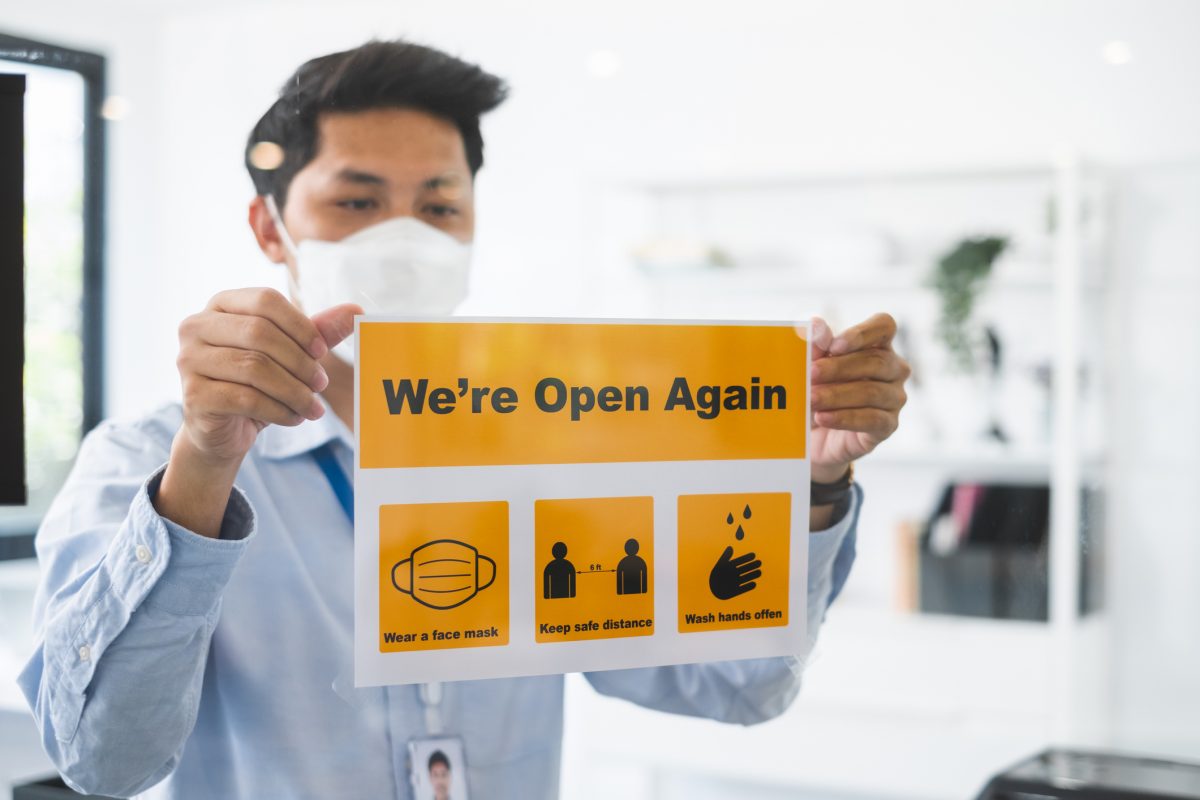Many GMS clients are looking at how they can successfully transition their workforce back to an office or facility location that meets new requirements for sanitation. The original move to a “work from home” environment may have been quickly implemented with very little planning due to the COVID-19 pandemic and various “stay at home” orders.
Returning to a place of work will require a thoughtful approach to the concepts of sanitation and cleanliness. In relocation terms, the return of employees is very similar to a group move. A number of specific points should be addressed to ensure health and safety for all employees.
3 Main Points to Consider with Sanitation
There are 3 main points a company should consider when it comes to sanitation: moving equipment back into a facility, work space configuration, and facility cleanliness.
1. Sanitation When Moving Equipment Back to a Workplace
The American Moving & Storage Association (AMSA) has issued guidance for consumers to ensure safety for all who move during the COVID-19 pandemic. This guidance also applies to moving equipment from an employee’s home back to a workplace. One of the points to consider is that employees should always use fresh supplies of packing materials for any equipment they plan to return to the office.
For example, employees planning to move computer equipment and supplies, file folders, and other office materials should ensure any box they use is new. Rolls of tape, packing papers, and storage boxes should all be new equipment that has not be used for any other purpose. GMS partners provide packing and moving services that are specifically targeted to ensuring health and safety for employees and the workplace.
Equipment that returns to a workplace should meet sanitation and cleanliness requirements. Desktop IT equipment that has been in use in a home environment may need specialized cleaning to ensure it does not transmit any issues back to a workplace such as:
- Microbes
- Insects
- Viruses
- Mold
- Dust
- Pet Dander
When in doubt, companies should look into sanitation and cleanliness of all incoming equipment to help ensure a clean and safe workplace. Companies may consider offering assistance to employees in the form of curbside return services. With these services, professional movers bring equipment back to a workplace and arrange for installation as well as cleaning and sanitation.
2. Workplace Configuration
The new normal for workplaces may be anything but normal to employees who may be used to close office environments and easy-going quick meetings in hallways, at desks, or in the lunchroom. Social distancing rules put forward by health authorities to help people protect themselves and others could require a new configuration for workplaces.
Generally, social distancing rules according to the Centers for Disease Control and Prevention require:
- At least 6 feet distance from coworkers
- No gathering in groups
- Avoid mass gatherings
- Do not enter crowded places
- Limit close contact with others
For some workplaces, entirely new office and work space designs may be required. Companies should review conference rooms, break rooms, lunch rooms, hallways, and other shared spaces with a focus on helping employees maintain social distancing. While social distancing may help reduce the need for workplace sanitation, it will not eliminate the need for companies to address this need.
Other considerations may involve how to configure storage. New space requirements may lead some companies to recognize a need to store equipment, file cabinets, and office furniture. Storage needs may be for the short term or the long term. Workplace size as well as changes driven by how work now actually gets done may dictate new and increased storage needs.
3. Workplace Sanitation
With equipment returning to workplaces and the need to ensure health and safety for employees, companies should review their workplace sanitation programs. Companies should examine equipment, facilities, door handles, tables, chairs, and even staplers in a shared copy room for patterns of use, cleanliness, and sanitation.
While some workplaces may already use good sanitation practices, the new normal with COVID-19 requires a greater focus on practices to ensure good health and safe practices. Many GMS network partners offer enhanced sanitation, including specialized services such as electrostatic disinfection.
Communication of new workplace rules is critical to help employees learn what is considered safe behavior, and what is not. Use of shared facilities such as a lunch room may require consideration as to occupancy and cleaning requirements. Workplace event coordination may be useful to help welcome employees while sharing about the new workplace and expectations. Motivating employees to become involved and engaged will help them gain a sense of belonging and purpose in their new workplace.
What Should Employers do?
Employers should look into all of the aspects surrounding sanitation as they plan for employees to return to the workplace. Packing, moving, and equipment sanitation should be considered. Also, employers should carefully review workplace configuration and potential storage requirements. The new normal for workplaces has changed significantly in light of the COVID-19 pandemic. A Relocation Management Company (RMC) with knowledge and experience in managing group moves is an ideal resource to help employers who are planning to move groups of employees back to central workplace.
Conclusion
Global Mobility Solutions’ team of corporate relocation experts has helped thousands of our clients understand how to arrange for group moves of offices, employees, and equipment. Our team can help your company understand how identify and address all of the aspects of a group move for your employees returning to the workplace while maintaining new sanitation and cleanliness standards.
GMS was the first relocation company to register as a .com, created the first online interactive tools and calculators, and revolutionized the entire relocation industry. GMS continues to set the industry pace as the pioneer in innovation and technology solutions with its proprietary MyRelocation® technology platform.
Learn best practices from Global Mobility Solutions, the relocation industry and technology experts. Contact our experts online to discuss your company’s need for information about helping employees return to the workplace while ensuring sanitation, or give us a call at 800.617.1904 or 480.922.0700 today.
We're Here to Help! Request a Courtesy Consultation
Are you ready to talk to a Mobility Pro? Learn how GMS can optimize your mobility program, enhance your policies to meet today’s unique challenges, receive an in-depth industry benchmark, or simply ask us a question. Your Mobility Pro will be in touch within 1 business day for a no-pressure, courtesy consultation.













